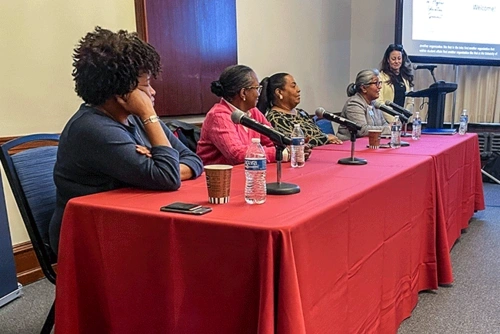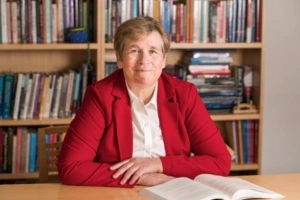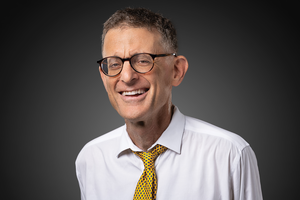Faculty Expert
A powerful, lively, and heartfelt panel took over the second floor of Houston Hall this past week as part of the seventh annual Women of Color in Higher Education Summit, hosted by the Penn GSE Dean’s Office, Center for Professional Learning, and Office of Student Services.

Open exclusively to women of color and non-binary people of color from Penn GSE or the Penn School of Social Policy & Practice, the summit provided information, perspectives, practical advice, and networking and mentorship opportunities — all aimed at giving attendees a broader set of tools with which to fight institutional inequities, confront systemic biases, overcome imposter syndrome, and own the work of self-care in a turbulent time.
“This is what students and women of color need: to hear and be surrounded by more of these stories and perspectives,” said Raquel Arredondo, the inaugural Assistant Dean for Diversity, Equity, & Inclusion at Penn GSE. “It helps us know we are not one; We are one of many.”
The summit opened with a brief address from Penn GSE Dean Pam Grossman, who discussed how the issues facing women in higher education have been near and dear to her ever since she was in the third class of women at Yale University.
“We were told in so many different ways, both explicitly and implicitly, that we really didn’t belong there,” said Grossman.
Decades later, Grossman pointed out, despite greater representation women in higher education are still beset by many of the same obstacles — and women of color even more so, as they deal with increased scrutiny, more negative teaching evaluations, and having their expertise questioned by students more than their white male counterparts, among countless other microaggressions.
That imbalance was at the heart of the keynote panel discussion, which headlined the event and featured the University of Pennsylvania’s University Life Leadership Team:
- Mamta Motwani Accapadi, PhD, Vice Provost for University Life
- Laurie A. Hall, Assistant Vice Provost for Strategic Planning and Operations
- Tamara Greenfield King, JD, Senior Associate Vice Provost for Student Affairs
- Sharon Smith, Associate Vice Provost for University Life
Creating a Space
University Life’s mission is to support undergraduate, graduate, and professional students as they engage in academic, artistic, civic, cultural, and pre-professional experiences. It is also deeply committed to diversity, equity, and inclusion across campus, from students up through staff, faculty, and leadership. Led by Accapadi, Penn’s University Life senior leadership team is unique in that it is comprised entirely of women of color.
“Find another organization like that in the Ivy Leagues,” said Accapadi. “And here’s the thing: It doesn’t take extraordinary effort. It takes stepping outside of the boxes we put around people and being courageous about the privileged identities we bring to the table.”
Accapadi pointed out that, being steeped in the culture of whiteness, higher education can strip women of color of the wisdom they’ve acquired from their experiences and their backgrounds. To help the next generations of students avoid having to make those sacrifices, she vowed when given the opportunity she would shape a team with a diverse background of lived experiences to serve as a model and create a space that uplifted the humanity of every student in the way they deserved.
For Smith, a first-generation immigrant who grew up in Jamaica, the formative years of her youth were spent around people who looked and talked like her — and told her consistently that she would be successful. Upon arriving to the United States at the age of 14, she found herself at a school with only six people who looked like her, packed with students who made fun of her accent.
That experience — of going from a supportive environment to one wherein she struggled to fit in with a country, community, and school that saw her as “the other,” demonstrated early on the importance of support and representation.
“When I’m in the room with many of you, I need to create a safe space,” Smith said. “I need you to know you can be comfortable with being who you are and owning who you are.”
“Understanding the need to create spaces for belonging and inclusion for people — for people to really participate in the building of the community they live in — is really important,” added Hall. “And it drives me every day. Coming to work to do that with this team is even better.”
Building Human Capital
Embedded in the discussion of creating empowering spaces is the importance for women of color to build human capital and surround themselves with those who will support them — and vice versa.
Accapadi shared with the room a story from earlier in her career when she, attending a function at her institution’s president’s house, was approached by a woman who handed Accapadi her trash and asked Accapadi to grab her a red wine.
“The next question is, of course, what did I do?” said Accapadi. “I threw away her trash and got her the red wine. What was I going to do, tell her off? Correct her? I don’t have the luxury of doing that. Certainly, my Black woman colleagues don’t have the luxury of doing that.”
The panel spoke about the mental health costs for women of color made to sit in sacrifice and comport themselves in a culture of whiteness that dictates they aren’t allowed to so much as get angry at a meeting. In a world such as higher education where many — even those who claim the mantle of progressiveness — can fail to recognize the privilege they bring to the table, aligning and surrounding yourself with those who do recognize these power structures is critical.
Speaking to the importance of forming your own “sister circles,” King noted the positive role models for women of color in popular culture are few and far between.
“Rap music? Not our friend, ladies,” said King. “Language, sexualization, objectification. Television? Not much better. Have you seen a healthy relationship between two women of color on television? No.”
Survival in that environment, King went on to say, means forming circles and developing networks of friends who will talk and work with you in given spaces. Because, as she points out, something that isn’t taught to students — and especially not women of color — in undergraduate and graduate education is the vital nature of finding your community of support.
“They don’t have to look like you,” said King. “They could have a different standard of living. But you need that community. I’m not talking about so-so people; I’m talking about people who have your back. Everywhere you go, women are going to be jealous and claw at you because that’s what society shows us through television, rap, and sports.”
“We’re collateral damage,” she added. “If we don’t form our own positive sister circles, they don’t exist. Be intentional about that. Nobody told me about it, and nobody’s ever going to tell you about it, but you have to do it.”
Referring back to how the tight-knit nature of the University Life team reflects that shared commitment, Accapadi explained how important it is for each of them to be able to have honest, forthright conversations with one another — and how essential that kind of connection is to the experience of a woman of color in communities still largely framed by whiteness.
“As a woman of color, we don’t have a choice: We have to build capital,” said Accapadi. “It’s a lived fact.”
Navigating Higher Education and Other Institutions
In traversing the complexities and overcoming the systemic biases of higher education and other large institutions, Accapadi spoke about how today’s women of color are up against the fact that women of color throughout history have routinely been positioned to serve everybody else.
“Humanity does not exist without Black women, without indigenous women,” said Accapadi. “The life force of humanity sits on the sacrifice of women of color, and I mean that in every way possible. Think about, in your organizations, how women of color engage with other demographics. Those of us in hiring spaces need to have honest conversations with our supervisors and take risks to establish the equitable narrative of our work in our organizations.”
Speaking to the importance of finding one’s voice and getting assertive in the effort to receive more equitable treatment, Smith shared a story from early in her career when, after being hired at the same time as two white colleagues, she watched them climb the corporate ladder faster than she did. When she asked her supervisor about it, she was met with a complete lack of concern or support — and so she did something she noted would not be anywhere near as easy to do later in her career: She walked away.
“I ended up in higher education six months later because I realized there was no way I was going to get support from that man,” said Smith. “The trigger is to ask. Ask and let them tell you, ‘No.’”
The panel discussed how they use their roles in University Life to instill support and foster community among the students they interact with on a daily basis — as well as instruct them on how to navigate corporate and business environments that can be discretely or openly hostile to women of color.
King noted that when talking to a student going through a difficult time at their work, if she believes their job isn’t right for them, she’s going to coach them out of it.
“I tell young professionals all the time: You don’t have to take it,” she said. “You don’t have to martyr yourself. Now, you give proper notice, and you never throw a grenade on the bridge when you cross it because you never know when you might have to walk back — but when people don’t value you, you don’t want to be in that space. You can’t make someone value you.”
King went on to add that part of self-empowerment for women of color involves being particular about one’s finances — because having some money put away makes saying “enough is enough” a much easier prospect.
Hall added to King’s comments, telling those in attendance to be selective about their friends, associates, and committee appointments.
“Sign up and volunteer for lots of things, but make sure those things are serving you, too,” said Hall. “Don’t give away your labor for free. Be careful about the extra things you take on, because those things should be feeding you as well.”
The panel wrapped with Accapadi and Arredondo briefly discussing how valuable and important platforms like the Women of Color in Higher Education Summit can be for creating a space and sharing stories — so many of which can often go completely untold.
After the Panel
Following the conclusion of the panel, summit attendees were invited to participate in breakout sessions along four separate tracks:
- Leadership
“Unapologetic Boundaries: New Leadership Tools for Women of Color,” hosted by GSE alumnus and self-care expert Shanta Marie Morrison Smith, EdD - Career Advancement
“Developing Identity: How Diverse Mentors Help Develop Women Leaders,” hosted by Rajashi Ghosh, PhD, Associate Professor of Human Resource Development and Department Chair of Policy, Organization, and Leadership at Drexel University - Personal Wellness
“Centering Self-Care: Pressing Pause and Prioritizing Mindfulness,” hosted by Charru Sharma, PhD, a Fulbright Visiting Faculty at Penn GSE - Diversity, Equity, and Inclusion
“Embracing YOU: Psychological Safety and Authenticity,” hosted by Penn GSE Assistant Dean for Diversity, Equity, & Inclusion Raquel Arredondo
The breakout sessions were followed by a dinner reception hosted in the Penn GSE courtyard where participants were given the opportunity to engage in mentorship matches.
Photo courtesy Steve McCann, University Life





